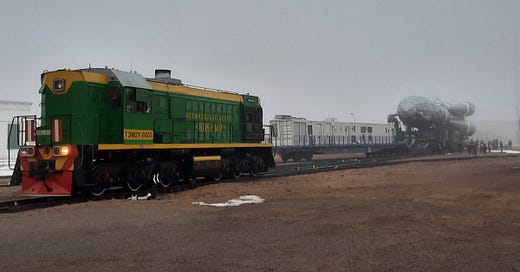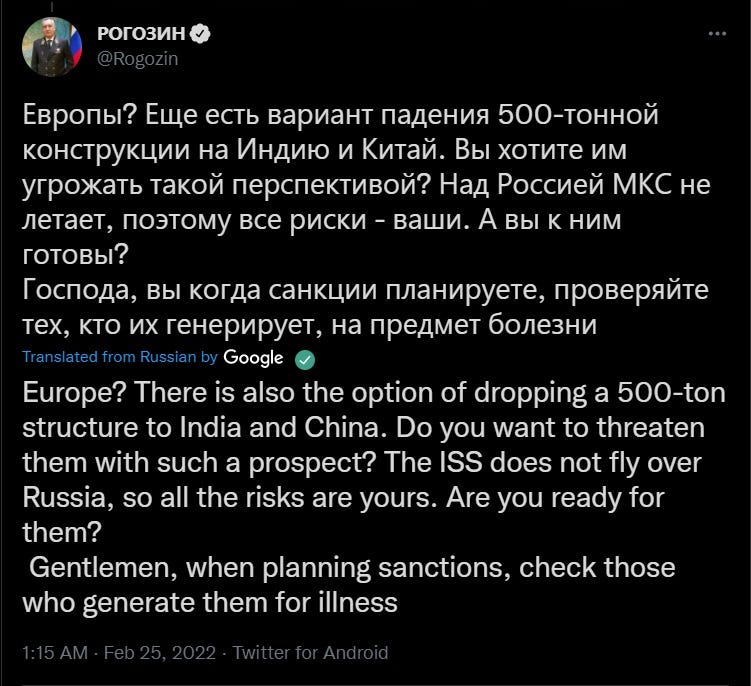Pradeep's Space Newsletter #35
How the conflict between Russia and Ukraine impacts the Indian space programme?
The Russian invasion of Ukraine has been strange from the space perspective. Roscosmos (the state corporation that offers spaceflight from Russia) Administrator Dmitry Rogozin has been quite an active component of the Russian state reaction to sanctions imposed on Russia. I have not seen space being so central part of the state reaction.
Usually, space relations are cold at worst and sometimes co-operation in the space sector continues despite poor relationship between states.
The President of the United States, Joe Biden, had announced sanctions against Russia for the invasion of Ukraine. He had suggested that the sanctions would affect the Russian aerospace sector in particular.
Rogozin replied to this announcement on Twitter. The thread is in Russian.

One of the tweets in the thread referred to India and China. This was reported widely in the Indian media. Twitter offers a Google Translate link under the tweet on both web and Android. Following is the screenshot to capture the Google Translate below it:
When read like this, it seems that he is discussing the “option” of dropping the International Space Station (ISS) on India or China. Read this translation as “chance” and the translation reads better, in context.
In the previous tweets, Rogozin is talking of the fact that sanctions on Russia would lead to no station-keeping. Station-keeping is a way to keep an object in the desired orbit. He had tweeted that if the Russian segments of the ISS were not available for station-keeping, there were chances that the ISS could re-enter over the United States, Europe, India or China.
But despite the rhetoric, Roscosmos did the required station-keeping operations on February 26, 2022:

Elon Musk replied thus to the tweet, indicating SpaceX would step up to the role.
There were other measures Roscosmos had taken like withdrawal of the Russian scientists and engineers from the offices of Arianespace’s Guyana Space Center in response to sanctions from Europe. ExoMars, Spektr-RG and Venera-D are some of the other affected space missions.
OneWeb is another launch that has been kept under suspense by Russia. OneWeb is a company in which India-based Bharti Enterprises has a majority ownership of 42.2%. The French aerospace company, Eutelsat owns 22.9% of the company.
As the invasion occurred, Roscomos tweeted that preparations were on for the next OneWeb launch scheduled for March 5.



The satellites were even given the clearance to be rolled out to the launch pad:


After being transported to the launchpad, it was about to go vertical:



It was ready for launch:



It was at this moment, a day or two before the launch that Roscosmos asked for the following:


In addition to Bharati and Eutelsat, OneWeb is owned by the United Kingdom Government, Softweb (the Japanese multinational holding company), Hanwa (a South Korean aerospace and defense company) and Hughes Network System (an American high-speed internet provider company).
Unlike SpaceX’s Starlink, OneWeb does not connect directly to customers. It connects to clusters, businesses and government. OneWeb is designed to use for defense customers within the government. This makes it difficult to agree to the demands that Russia makes above.
There is also fear of loss of capital as OneWeb had paid in advance for the launch to Arianespace. It is not known what would happen to the cluster of 34-36 satellites on-board the Soyuz on the launch-pad in case of an abort.
The r/ISRO sub-Reddit discussed other rocketry related cases of Indian dependence on Russia which may be affected. This could affect Gaganyaan launches further if any sub-system or parts are to be imported into India from Russia.
It could affect the tests of the Semi-Cryogenic Engine (SCE-200) which were to be done in Ukraine. There were reports that the Centers where these were built and tested could have been damaged.



SCE-200 is an important component of the up-rating GSLV Mk-III project. It is intended to improve the performance of the GSLV Mk III and enable it to carry 7.5 tonnes to GTO from it’s current capability of 4 tonnes.
These are the India-space-related stories that emerged from the Russian invasion of Ukraine in 2022. Some of these news are subjected to change and it is a developing situation.
(This was written on the night of March 3, 2022 and may not include the latest update.)
ISRO Reads





Those specifics of SCE200 tests in Ukraine from this old post.
https://www.reddit.com/r/ISRO/comments/qjqbqd/sce200_development/